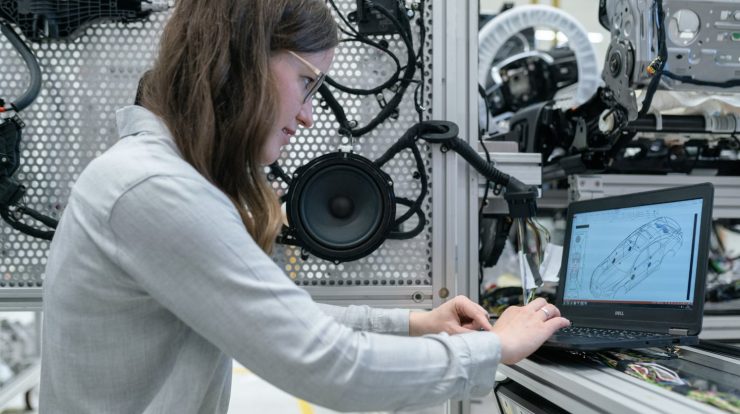In the fast-paced world of manufacturing, companies are constantly seeking innovative solutions to enhance efficiency, reduce costs, and improve overall productivity. Enterprise Resource Planning (ERP) software has emerged as a game-changer, revolutionizing the way manufacturers manage their operations.
Specifically designed for the manufacturing industry, ERP manufacturing software integrates various business functions, departments, and processes into a single unified system.
This article explores the benefits and functionalities of ERP manufacturing software and its role in driving success for modern manufacturing enterprises.
Operations with ERP Manufacturing Software

Streamlined Operations and Increased Efficiency
One of the primary advantages of ERP manufacturing software is its ability to streamline operations. By consolidating data from various departments, including procurement, inventory management, production planning, scheduling, and quality control, ERP software eliminates data silos and promotes better collaboration across the organization.
This integration allows manufacturers to have a comprehensive view of their operations, enabling better decision-making and efficient resource allocation.
With real-time visibility into all aspects of the manufacturing process, companies can optimize production workflows, reduce lead times, and improve on-time deliveries.
ERP software automates repetitive tasks, such as data entry, generating reports, and inventory management, freeing up employees to focus on more value-added activities. As a result, manufacturers can achieve higher productivity levels and reduce operational costs.
Effective Resource Planning and Inventory Management
ERP manufacturing software provides robust tools for effective resource planning and inventory management.
By analyzing historical data, demand forecasts, and production schedules, the software helps manufacturers optimize resource utilization, ensuring that the right materials, equipment, and labor are available when and where they are needed. This minimizes the risk of stockouts, reduces excess inventory, and eliminates production bottlenecks.
Additionally, ERP software enables manufacturers to implement efficient inventory control mechanisms, such as just-in-time (JIT) and lean manufacturing practices.
Through accurate demand forecasting and automated reorder points, manufacturers can maintain optimal inventory levels, reduce carrying costs, and improve cash flow.
Quality Control and Compliance
Maintaining high product quality is crucial for any manufacturing organization. ERP manufacturing software includes robust quality control modules that facilitate adherence to industry standards and regulations.
From tracking and managing product specifications to monitoring quality assurance processes, the software ensures that manufacturers meet customer expectations and comply with regulatory requirements.
By capturing real-time quality data and performing statistical analysis, ERP software enables manufacturers to identify quality issues promptly, initiate corrective actions, and prevent recurrence.
This proactive approach to quality control helps minimize rework, waste, and customer complaints, ultimately improving customer satisfaction and brand reputation.
Enhanced Supply Chain Management
ERP manufacturing software plays a vital role in optimizing supply chain management. It integrates suppliers, distributors, and other external stakeholders into the system, facilitating seamless communication and collaboration.
With real-time visibility into supplier performance, manufacturers can make informed decisions regarding sourcing, lead times, and supplier relationships.
Furthermore, ERP software enables manufacturers to implement vendor-managed inventory (VMI) programs, where suppliers are responsible for monitoring and replenishing inventory levels. VMI reduces stockouts, optimizes lead times, and strengthens the overall supply chain ecosystem.
Business Intelligence and Decision-Making
ERP manufacturing software provides manufacturers with powerful reporting and analytics capabilities. By consolidating and analyzing data from various sources, the software generates meaningful insights that enable informed decision-making.
Manufacturers can track key performance indicators (KPIs), monitor production efficiency, analyze sales trends, and identify areas for improvement.
These insights empower management to implement data-driven strategies, such as process optimization, demand forecasting, and capacity planning.
By leveraging the power of ERP software, manufacturers can adapt quickly to market changes, identify new growth opportunities, and gain a competitive edge.
The Future of ERP Manufacturing Software: Embracing Technology Advancements

As technology continues to advance at an unprecedented pace, the future of ERP manufacturing software holds immense potential for further transforming the manufacturing industry. With the advent of emerging technologies such as artificial intelligence (AI), machine learning (ML), Internet of Things (IoT), and cloud computing, ERP software is poised to become even more powerful, intelligent, and adaptable. This article explores the future trends and advancements in ERP manufacturing software, highlighting the opportunities they present for manufacturers.
AI and Machine Learning
AI and machine learning are set to revolutionize ERP manufacturing software by enabling intelligent automation, predictive analytics, and decision-making capabilities. AI-powered algorithms can analyze vast amounts of data in real-time, identifying patterns, optimizing processes, and detecting anomalies.
Machine learning algorithms can continually learn from data inputs, improving accuracy and providing valuable insights to manufacturers.
With AI and machine learning, ERP manufacturing software can automate repetitive tasks, such as data entry, quality control checks, and inventory management, freeing up valuable human resources for more strategic activities.
Predictive analytics capabilities can help manufacturers anticipate demand, optimize production planning, and proactively manage supply chain disruptions. Overall, AI and machine learning will enhance efficiency, reduce costs, and enable manufacturers to make data-driven decisions with greater precision.
Internet of Things (IoT) Integration
The integration of IoT devices and sensors with ERP manufacturing software will unlock new possibilities for real-time data collection, analysis, and control. IoT-enabled devices can gather data from machines, production lines, and inventory systems, providing a comprehensive view of the manufacturing process.
This data can be seamlessly integrated into the ERP system, enabling manufacturers to monitor equipment performance, detect maintenance needs, and optimize production schedules.
By leveraging IoT integration, manufacturers can achieve better asset utilization, reduce downtime, and improve overall equipment effectiveness. IoT data combined with advanced analytics can also facilitate predictive maintenance, helping to prevent equipment failures and minimize production disruptions.
The real-time insights provided by IoT integration will empower manufacturers to proactively address operational challenges and optimize their manufacturing processes.
Cloud Computing and Mobility
The future of ERP manufacturing software lies in the cloud. Cloud-based ERP solutions offer several advantages, including scalability, flexibility, and accessibility.
Manufacturers can leverage cloud infrastructure to deploy and manage their ERP systems, eliminating the need for on-premises hardware and reducing maintenance costs.
Cloud-based ERP solutions also enable seamless integration with other applications, such as customer relationship management (CRM) and supply chain management (SCM) systems.
Furthermore, cloud computing enables mobility, allowing manufacturers to access critical data and functionalities from anywhere, at any time, using various devices.
This flexibility promotes better collaboration among employees, suppliers, and customers, facilitating efficient decision-making and improving responsiveness to market demands.
Enhanced User Interfaces and Visualization Tools
The future of ERP manufacturing software will prioritize user experience through intuitive interfaces and powerful visualization tools.
ERP systems will feature user-friendly dashboards and customizable reports, presenting data in a visually appealing and easily digestible format. Manufacturers will be able to gain actionable insights at a glance, making informed decisions more efficiently.
Additionally, augmented reality (AR) and virtual reality (VR) technologies may be integrated into ERP manufacturing software, enabling immersive experiences for training, maintenance, and process simulations. These technologies will enhance employee productivity, reduce errors, and support continuous improvement initiatives.
The future of ERP manufacturing software is marked by the convergence of emerging technologies, offering manufacturers unprecedented opportunities to optimize operations, boost productivity, and drive innovation. AI and machine learning capabilities will empower manufacturers with intelligent automation and predictive analytics.
IoT integration will enable real-time monitoring and control of the manufacturing process. Cloud computing and mobility will enhance scalability, flexibility, and collaboration. Finally, enhanced user interfaces and visualization tools will improve the user experience.
Addressing Challenges and Ensuring Success

While the future of ERP manufacturing software holds great promise, manufacturers must also address certain challenges to ensure successful implementation and utilization of these advanced technologies. This section explores key considerations and strategies for manufacturers to overcome challenges and maximize the benefits offered by the future of ERP manufacturing software.
Data Security and Privacy
With increased connectivity and data sharing through IoT devices and cloud-based solutions, manufacturers need to prioritize data security and privacy. It is crucial to implement robust cybersecurity measures to protect sensitive information from unauthorized access and potential cyber threats.
Encryption, access controls, and regular security audits are essential components of a comprehensive data security strategy. Manufacturers should also comply with relevant data protection regulations to maintain customer trust and mitigate legal risks.
Change Management and Workforce Adaptation
The implementation of advanced ERP manufacturing software requires a well-executed change management strategy. Employees need to be prepared for the shift in processes, roles, and responsibilities. Training programs, workshops, and ongoing support should be provided to help the workforce adapt to the new technologies and workflows.
Effective change management also involves clear communication about the benefits and purpose of the new system, addressing any concerns and soliciting feedback from employees to ensure their engagement and buy-in.
Integration and Interoperability
As ERP systems become more sophisticated and interconnected, manufacturers may face challenges related to system integration and interoperability. It is crucial to select an ERP solution that can seamlessly integrate with existing systems, such as CRM, SCM, and other legacy software.
Open APIs and standardized data formats enable smooth data exchange and facilitate interoperability between different systems. Collaborating with experienced ERP vendors and IT experts can help ensure a successful integration process.
Scalability and Flexibility
Manufacturers should consider the scalability and flexibility of their chosen ERP manufacturing software to accommodate future growth and changing business needs. Scalable solutions can handle increasing data volumes, user loads, and expanded functionalities without compromising performance.
Additionally, the software should be flexible enough to adapt to evolving market conditions, regulatory requirements, and technological advancements. Regular system updates and vendor support are crucial to keep the ERP software up-to-date and aligned with business goals.
Continuous Improvement and Innovation
Embracing the future of ERP manufacturing software requires a mindset of continuous improvement and innovation. Manufacturers should encourage a culture of experimentation and exploration, where employees are empowered to identify process inefficiencies, propose improvements, and leverage the capabilities of the ERP system to drive innovation.
Regular assessments, data analysis, and performance monitoring can help identify areas for optimization and enable manufacturers to stay ahead of the competition.
Conclusion
The future of ERP manufacturing software holds immense potential to revolutionize the manufacturing industry. By addressing challenges related to data security, change management, integration, scalability, and continuous improvement, manufacturers can unlock the full benefits offered by advanced ERP technologies.
Embracing the future of ERP manufacturing software with a strategic approach will empower manufacturers to optimize operations, enhance productivity, and drive sustained success in an increasingly competitive landscape.





